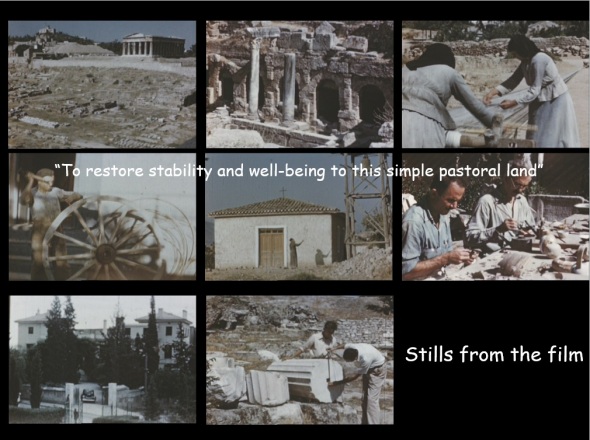Exploring the Relationship of the American School of Classical Studies at Athens with the Greek Omogeneia in the United States in the 1940s.
Posted: July 4, 2019 Filed under: Archaeology, Archival Research, Biography, History of Archaeology, Mediterranean Studies, Modern Greek History, Philhellenism | Tags: American School of Classical Studies at Athens, Greek War Relief Association, Nikolaos Mavris, Omogeneia, Oscar Broneer, Spyros Skouras, Theodore Leslie Shear, Triumph Over Time 7 CommentsIn 1947, the American School of Classical Studies at Athens (ASCSA or the School hereafter) produced a color movie titled Triumph over Time; it was directed by the archaeologist Oscar Broneer and produced by the numismatist Margaret E. Thompson with the aid of Spyros Skouras (1893-1971), the Greek American movie mogul and owner of Twentieth Century Fox (see Spyros Skouras Papers at Stanford University). Triumph over Time portrays Greece rebounding from World War II and the staff of the ASCSA preparing archaeological sites for presentation to postwar tourists. The film was made to promote the first postwar financial campaign of the ASCSA, the direct goal of which was to increase its capital and finance the continuation of the Athenian Agora Excavations. Indirectly, the ASCSA was hoping to contribute to the rehabilitation of Greece by providing employment for the Greek people and by promoting the economic self-sufficiency of Greece by developing the country’s tourist assets (Vogeikoff-Brogan 2007).

Oscar Broneer, ca. 1938. ASCSA Archives, Oscar Broneer Papers.
Triumph over Time begins with a brief overview of impressive Greek antiquities, such as the citadels of Mycenae and Tiryns and the Temple of Poseidon at Sounion, before continuing with rare ethnographic material capturing parts of rural Greece that no longer exist. It then moves from the Greek countryside to the buildings of the ASCSA, especially the Gennadius Library with its rare treasures. The story then covers the ASCSA’s two most important projects, the excavations at the Athenian Agora and at Ancient Corinth, explaining all stages of archaeological work. The documentary ends with a hopeful note that financial support of the ASCSA’s archaeological work will contribute to an increase in tourism so that this major source of revenue for Greece’s economy can “restore stability and well-being to this simple pastoral land.”

Stills from Triumph Over Time

